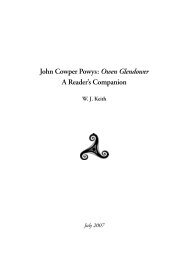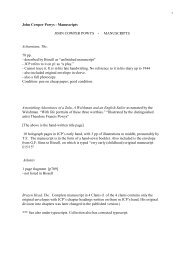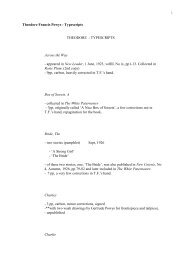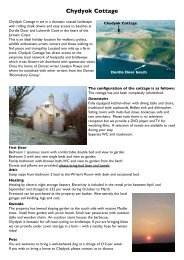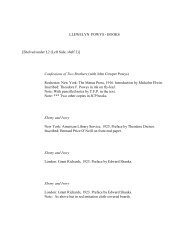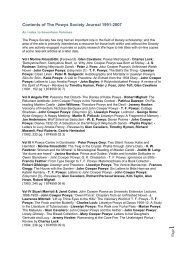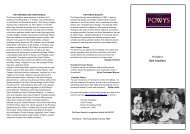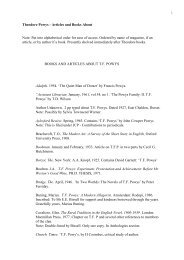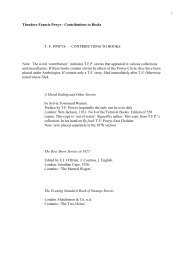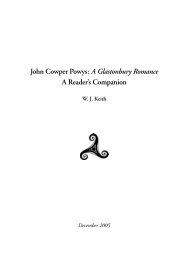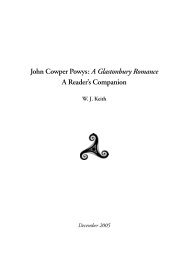J. C. Powys' Autobiography: A Reader's Companion - Site POWYS
J. C. Powys' Autobiography: A Reader's Companion - Site POWYS
J. C. Powys' Autobiography: A Reader's Companion - Site POWYS
You also want an ePaper? Increase the reach of your titles
YUMPU automatically turns print PDFs into web optimized ePapers that Google loves.
50 <strong>Autobiography</strong><br />
Redcliff (273), Redcliff Bay (15, 139) — There is a<br />
Redcliff Point on the coast to the northeast of<br />
Weymouth.<br />
redeemed ... sorrows (130) — Adapted from<br />
Shakespeare’s King Lear (V iii 266), also quoted in<br />
After My Fashion (272), Weymouth Sands (321),<br />
The Complex Vision (95), In Defence of Sensuality<br />
(123), and The Pleasures of Literature (163).<br />
Regan and Goneril ... that look (218) — Regan<br />
and Goneril are the two disloyal daughters in<br />
Shakespeare’s King Lear, both in love with<br />
Edmund. The reference here is to IV v 25–6.<br />
Regent (254) — The future King George IV, King<br />
of England from 1820 to 1830, who served as<br />
regent, 1811–1820, during the mental instability of<br />
his father, who reigned from 1760 until 1820. He is<br />
now best known for his association, as here, with<br />
Brighton Pavilion.<br />
Reigate (342) — A town south of London, in<br />
Surrey.<br />
Rembrandt (301; cf. 302) — Rembrandt von Rijn<br />
(1606–1669), Dutch painter well known for his<br />
portraits and his use of shadow.<br />
“reservoirs of magnetism” (525) — Not identified.<br />
“Resolve to live ... in the Beautiful” (501) — From<br />
Goethe, also quoted in The Meaning of Culture<br />
(251), The Pleasures of Literature (263), Mortal<br />
Strife (167), and Letters to Ichiro Hara (139).<br />
Return of the Native, The (64, 99, 309) — A novel<br />
by Hardy (1878).<br />
Reynolds, Sir Joshua (251) — British portrait<br />
painter (1723–1792), first President of the Royal<br />
Academy. The reference is perhaps to the figure<br />
of Joseph in Reynolds’s painting The Holy Family<br />
(1789) in the Tate Gallery collection. NB:<br />
“Reynold’s” is, of course, an error.<br />
Rhoades, James (131) — Latin teacher and poet<br />
(1841–1923). His translations of Vergil were<br />
eventually published in the “World’s Classics”<br />
series. Littleton (70) writes more positively of him<br />
than JCP, ending with the statement: “I was<br />
grateful to him.”<br />
Rhodes (301) — Cecil Rhodes (1853–1902), British<br />
businessman and administrator who expanded<br />
British power in Africa. Rhodesia (now<br />
Zimbabwe) was named after him.<br />
Rhys, Sir John (284) — Welsh scholar (1840–1915),<br />
whose Studies in the Arthurian Legend (1891) was<br />
much used by JCP when writing A Glastonbury<br />
Romance, Maiden Castle, and Porius. See also<br />
under “bundling.”<br />
“rich and strange” (306; cf. 67) — From<br />
Shakespeare’s The Tempest (I ii 401), also quoted<br />
in Visions and Revisions (xxi), In Defence of<br />
Sensuality (17, 165), Elusive America (45), and cf.<br />
Rabelais (15).<br />
Richardson, Dorothy (524) — English novelist<br />
(1873–1957), known for her Pilgrimage cycle. JCP<br />
admired her work, and published a pamphlet<br />
about her, Dorothy M. Richardson (1931).<br />
Richmond Villa (133, 393) — Llewelyn’s residence<br />
while teaching at Sherborne Preparatory School.<br />
Rider and Company (181) — William Rider & Son,<br />
the London publishing company in which Ralph<br />
Shirley (q.v.) had a controlling interest and which<br />
brought out JCP’s early poetry. Noted for its<br />
occult list.<br />
“rigged in the eclipse and built with curses dark”<br />
(474) — From Milton’s “Lycidas” (l.101). JCP<br />
reverses the words “rigged” and “built.”<br />
Riley, [J.] Whitcomb (605) — American poet (1849-<br />
1916), author of “Little Orphan Annie,” best<br />
known for The Old Swimmin’ Hole and ‘Leven<br />
More Poems (1883).<br />
“rise again” (401) — Alluding to a passage from<br />
the Nicene Creed in the Anglican Communion<br />
service.<br />
“rising of the gorge” (11) — A traditional phrase,<br />
but perhaps echoing “my gorge rises at it” in<br />
Shakespeare’s Hamlet (V i 207).<br />
“rising to immortality and intense happiness”<br />
(642, 643, 649) — Not identified; perhaps a JCP<br />
invention, but cf. Letters to Ross (38–9).<br />
Robertson’s History of the Church (283; cf.<br />
152) — The History of the Christian Church by<br />
James Craigie Robertson, published between<br />
1854 and 1873. Littleton records JCP’s borrowing<br />
these volumes from the Sherborne School Library<br />
in 1890–1891 (The Joy of It [67–8]). NB:<br />
“Robinson’s” (152) is an error.<br />
Robinson, Edwin Arlington (451, 471) — American<br />
poet (1869–1935), best known for his somewhat<br />
lugubrious poems about New England people. He<br />
also wrote long poems on Arthurian themes.<br />
Ronald Mathias (81) believes that JCP only met<br />
Robinson once, on the occasion described here.<br />
rocks and stones and trees (26, 633) — The order<br />
suggests a likely echo of Wordsworth’s “A<br />
Slumber Did My Spirit Seal” (l.8), also alluded to<br />
in The Inmates (214), Porius (278), In Defence of<br />
Sensuality (7, 221–2, 282), and Letters to Ichiro<br />
Hara (138).<br />
“rod and staff” (204) — Psalm 23:4.<br />
Roderic Mawr (141) — Roderick (sic) or Rhodri<br />
Mawr, King of Gwynedd and Powys from whom<br />
Owen Glendower claimed descent. JCP also<br />
wrote of his father’s pride in this ancestor in The<br />
Dorset Year (262) and Letters to Glynn Hughes<br />
(59). JCP’s first privately published story, “The<br />
Hamadryad and the Demon,” reprinted in Powys<br />
Newsletter 2 (Colgate University), 1971, was<br />
signed “Roderick Mawr.”<br />
Roderigo (91) — A gullible and foolish character<br />
in Shakespeare’s Othello.



